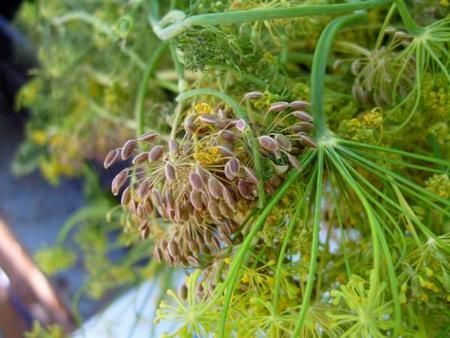Dill is a plant known to every inhabitant of our country, having excellent taste qualities and having a lot of useful properties. They use it not only in cooking, but also in medicine, as well as cosmetology. What are the useful properties of this plant, which helps the broth of dill, as well as the possible contraindications for its use, we consider below.

Useful properties of dill
Useful properties in dill - the mass, all due to the rich composition of this plant:
- is primarily a fossil of vitamins and minerals, its seeds contain essentialoil, which has a huge benefit;
- dill has a laxative, diuretic, carminative, hypotensive and expectorant effect;
- it promotes the work of the gastrointestinal tract, normalizes metabolic processes in the body, dilates blood vessels;
- tinctures and decoctions of dill are used as part of complex treatment for diseases of the kidneys, liver, bile ducts, hypertension and other diseases;
- also has dill antiseptic and bactericidal action;
- this plant helps to remove toxins from the human body;
- is extensively widely used for the treatment of ophthalmic diseases;
- indispensable dill broth for flatulence, colitis, constipation.
Use of dill in traditional medicine
As a remedy, traditional medicine uses mostly dill seeds. In this case, either tinctures or decoctions are prepared from them. There are many recipes for preparing decoction from fennel seeds, but in general, they are the same: a certain amount of seeds is poured with a small amount of water( 1 glass of water is often used for 1 tablespoon of the seed) and boiled for 5-10 minutes. When preparing the same tincture, the seeds are poured with boiling water and allowed to stand in a dark cool place for half an hour.

So, in what cases is it recommended to take a broth of dill:
- for diseases of the gastrointestinal tract, to stimulate appetite, improve bowel function, its peristalsis;
- in bronchitis, as an effective expectorant;
- for diseases of the cardiovascular system and for headaches;
- for the normalization of the nervous system;
- for insomnia, as a soft sedative;
- due to bactericidal and diuretic properties, dill broth is used for certain diseases of the urinary system;
- in diseases of the intestines, as well as the gall bladder, dill has a positive effect on the smooth muscles of the internal organs;
- with a tendency to increased pressure;
- in the treatment of certain ophthalmic diseases;
- for lactation problems in lactating women;
- for whitening pigment spots and freckles, as well as for washing hair.
Dill for newborns
One of the most common problems in a newborn baby and his mother is, first of all, gases and colic caused by the adaptation of the child's organism to the environment, to conditions different from the mother's womb. To date, the pharmaceutical market is simply overcrowded with drugs that promise parents and their children a calm, no pain and tears of night and days. But are all these drugs effective, and most importantly, are they safe?
Folk medicine offers a proven method for many generations to get rid of bloating of small tummies - dill broth for newborns. Essential oils of dill contribute to the early establishment of peristalsis, promote the relaxation of the intestines of the baby, resulting in less children having meteorism.

Important! In cases of preparation of the decoction for children use less seeds - 5 grams of seeds per glass of water. At the same time, the baby should be offered dill water carefully, starting with 1 teaspoon, watching the reaction of the baby.
Also, the broth of dill intended for a newborn baby can be taken by the mother of the baby, nursing the baby. Such a decoction, as already mentioned above, is an excellent, lactation-enhancing agent.
Fennel during pregnancy
As for women in the situation, it should be applied carefully and strictly after agreement with the doctor conducting the pregnancy. Although in general dill affects positively on expectant mothers:
- saves them from early toxicosis;
- fights with constipation;
- due to its diuretic effect reduces swelling in pregnant women;
- enriches the body with beneficial substances;
- promotes normal functioning of the nervous system, eliminates insomnia.
Important! Remember that the amount of decoction used during pregnancy should be strictly agreed with the doctor.
Contraindications to the use of dill broth
First of all, it is necessary to carefully use the decoction of dill seeds( due to its ability to lower blood pressure) to hypotensive people - people prone to low arterial pressure. The use of dill seeds in any form can provoke weakness in these people, dizziness and even fainting. For the sake of justice it is worth noting that such a range of unpleasant sensations can arise only due to a systematic excess of the norm of the used broth or tincture.
Individual intolerance of components contained in plant seeds and reactions in the form of allergy to its administration is also not excluded.
As you can see, a decoction of dill seeds can bring not only good, but also harm. Therefore, before you begin to regularly receive this medicinal plant, you need to consult a doctor, especially for pregnant women and parents who are going to give their newborn children a decoction of fennel.
So, a decoction of dill seeds is a simple, inexpensive, extremely useful and effective medicine, the use of which can save a person from many health problems.
